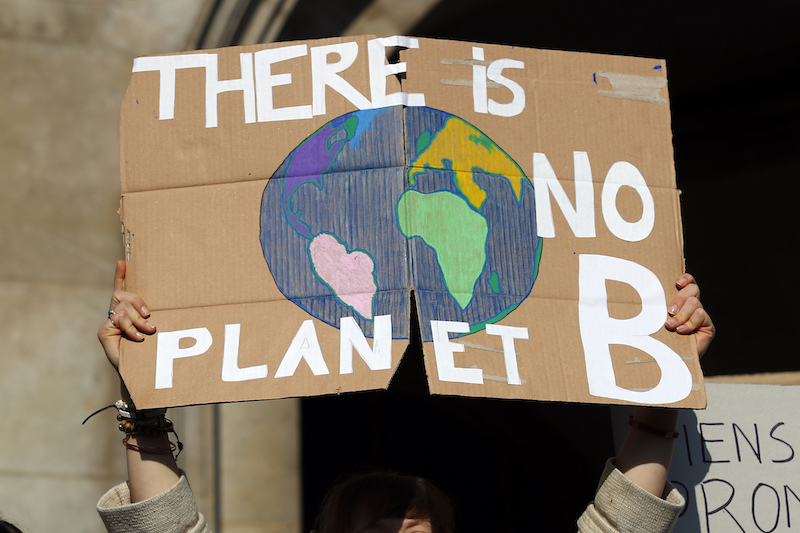Researchers: Violence, War and Climate Change Are Linked
Poor people will experience even more of these adverse effects, according to a study from Iowa State University. A student holds a placard during a demonstration in Paris, France, on Friday to draw attention to climate change. (Francois Mori / AP)
A student holds a placard during a demonstration in Paris, France, on Friday to draw attention to climate change. (Francois Mori / AP)
LONDON—Stand by for long hot summers marked by riot and racial tension. As climate change stokes mayhem, global warming is likely to see a direct rise in human irritability.
Climate change accompanied by natural disaster such as flood or drought could lead to harvest failure and food and water shortages for which people must compete.
And the same natural disasters could lead to a generation of babies, children and adolescents more likely, because of disadvantage and deprivation, to become more prone to violence in adulthood.
Researchers in the US have been thinking carefully about the links between climate change and conflict. This, they write in Current Climate Change Reports, has a long history, and a huge range of studies have addressed the hazard.
And they see more civic strife and conflict on the way. Some of it is likely to involve climate refugees, or ecological migrants: persons driven from their homes by climate change. The steady rise in global temperatures could also help incubate the conditions for global terrorism.
“This is a global issue with very serious consequences. We need to plan for ways to reduce the negative consequences,” said Craig Anderson, a psychologist at Iowa State University in the US.
“An inadequate food supply and economic disparity make it difficult to raise healthy and productive citizens, which is one way to reduce long-term violence. We also need to plan for and devote resources to aid eco-migrants in their relocation to new lands and countries.”
The Iowa scholars are not alone. Other research teams have linked rising urban temperatures and conflict; and even self-harm.
Some have identified direct links between protracted drought, conflict and the floods of climate refugees, and other groups have repeatedly warned that the numbers driven from their homes by drought, flood, fire, sea level rise and devastating hurricanes is likely to rise steeply within a generation.
Direct Link
Professor Anderson and his co-author took a long cool look at the literature of heat and violence. They found direct connections between ambient temperature and hostility.
In one experiment, police officers in overheated conditions were found to be more likely to respond to suspected burglary by drawing a gun and opening fire. Another study compared temperature with levels of violence in 60 different countries and found that for every one degree Celsius rise in temperatures due to climate change, homicide rates could rise by 6%.
A match of crime reports over 59 years with weather data confirmed that violent crime rates rose in the hotter years in 53 out of 55 instances for which seasonal data were available.
They also found that food insecurity and poor nutrition before and after birth could be linked to violent and aggressive behavior in later years. And they noted the dangers of clashes when migrants were driven across borders and displaced people were attacked by the locals.
Worst for Poorest
“Syria offers us a glimpse of what the future might look like as the climate continues to change rapidly: weather becomes more severe, and countries begin falling into economic and civil distress,” they write.
And the already disadvantaged will experience what they call a disproportionate amount of the harmful effects of rapid climate change, which will “likely produce breeding grounds for new terrorist (or gang) activity, a global strain on available resources and the involvement of the developed countries in small-scale wars breaking out across the globe.”
But developed countries can help: this would require, above all, some sharp changes in response to the refugee crisis.
“The view that citizens of wealthy countries often have about refugees needs to change,” Professor Anderson said, “from seeing them as a threat to a view that emphasises humanitarian values and the benefits refugees bring when they are welcomed into the community.”
Your support matters…
Independent journalism is under threat and overshadowed by heavily funded mainstream media.
You can help level the playing field. Become a member.
Your tax-deductible contribution keeps us digging beneath the headlines to give you thought-provoking, investigative reporting and analysis that unearths what's really happening- without compromise.
Give today to support our courageous, independent journalists.






You need to be a supporter to comment.
There are currently no responses to this article.
Be the first to respond.